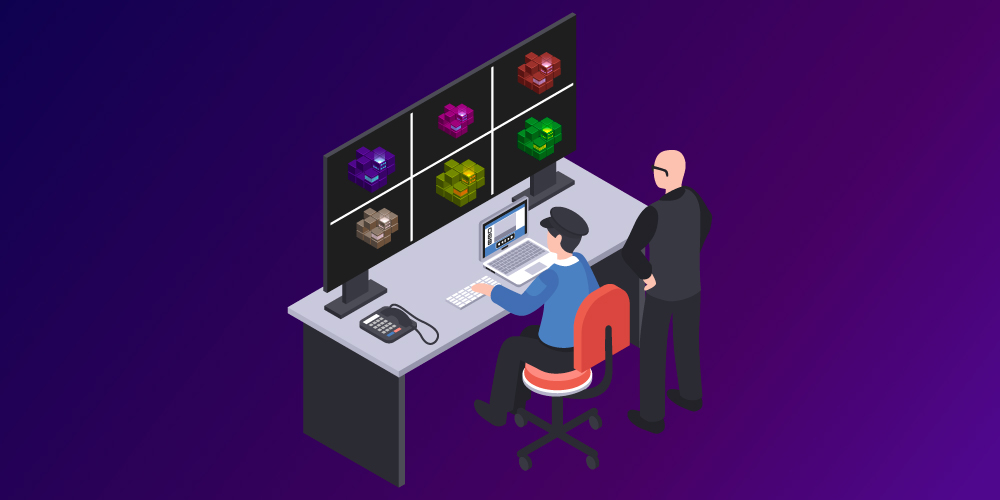Blockchain technology undoubtedly has many advantages, especially cryptographic security, although it has several problems. Let’s discuss the blockchain security issues that are on the agenda.
Huge Doubts about Blockchain Security
Blockchain technology is a prime example of the transformation of the principles of financial transaction security and information exchange. It offers a unique data structure with built-in security features. Blockchain is based on the principles of consensus, decentralization, and cryptography to ensure trust in transactions. However, blockchain security issues continue to worry many organizations and users.
Even well-established blockchain startups are experiencing problems with their security. Moreover, many undesirable risks continue to arise in the area of blockchain security and raise a serious question: “Is blockchain really secure?”
Blockchain is more important now than ever
The world aims to jump into the next wave of digital transformation, especially with blockchain technology. The blockchain was able to attract attention from all sides with its unique functionality. It is suitable for different use cases. In fact, this has evolved into a robust approach to improving the security and transparency of technology solutions.
Blockchain technology basically involves storing various bits of digital information, known as blocks, in a public database. Data blocks have cryptographically secure connections between them. Blockchain has become popular mainly because of the restriction on “double spending”. The blockchain does not allow the same currency to be used in two different transactions.
Now let’s take a quick look at the components in the blockchain before we talk about the security vulnerability of the blockchain. The blocks include three main information elements, such as:
- Information on the transaction, including the date, amount, and time of purchase.
- A unique algorithmic hash or code to distinguish one block from others
- The identity of each party associated with the transaction
You can then add new blocks to the block chain for new transactions. The block receives a unique identification code after verifying a new transaction.
Differences in blockchain security depending on the type of blockchain
The difference in security for a public and private blockchain is also another highlight of blockchain security. Blockchain networks can have different implications regarding participation privileges and data access. So you can find two different types of labeling for blockchain networks. Depending on the privileges for participation, blockchain networks can be private or public. On the other hand, the methods by which participants gain access to the network determine whether the network is allowed by the blockchain or not.
Public blockchain networks are open and can allow anyone to join, ensuring the anonymity of participants. The public blockchain uses computers connected to the Internet to verify transactions along with reaching consensus.
Private blockchain networks depend on an individual to verify membership and access rights. In addition, they allow only familiar organizations to participate.
Understanding security Issues with Different Types of blockchain networks
promotes a better understanding of security issues. Evaluating the type of network that is suitable for your business goals can help you make a better choice. For example, private and authorized networks may have stricter regulatory compliance controls. But public networks and networks without permission, on the contrary, can contribute to better distribution and decentralization.
And so: is the blockchain really secure?

All descriptions of blockchain technology point to cryptography, immutability, and decentralization. Thanks to its cryptographic security and the certainty that no one can change the data without the knowledge of other participants, the blockchain definitely seems secure. The blockchain can provide you with a transaction account that is protected from unauthorized access.
However, this does not mean that the blockchain is immune to cyber attacks and security fraud. People with malicious intent can use blockchain security vulnerabilities to their advantage. Many such examples of attacks on the blockchain from time to time get into the news. Here are some of the notable incidents that reveal the most unpleasant aspect of blockchain.
- Case of missing keys
The theft of customers’ cryptocurrencies from the Bitfinex crypto exchange in Hong Kong shows that the blockchain is not so secure after all. The estimated value of Bitcoin was about $73 million. Experts pointed out that the most likely cause of the incident was stolen private keys or personal digital signatures.
- Exploited code
The next notable event that demonstrates the security and privacy concerns of blockchain technology concerns a Decentralized Autonomous Organization (DAO). It is a venture fund operating on the basis of a decentralized blockchain. Interestingly, many believe that the DAO was inspired by Bitcoin.
Hackers robbed the foundation of more than $60 million in Ether. The blow was quite heavy for the DAO, as it accounted for almost a third of its total value. The exploitation of the code was the main reason for this event, and rightly showed the vulnerability of the blockchain.
- Hacking the employee system
Another example of blockchain security issues is Bithumb. It is also one of the largest cryptocurrency exchanges. Hackers were able to dig into the data of about 30,000 users, and also stole Bitcoin worth $870,000. Interestingly, the main servers were intact, and the main culprit was the employee’s compromised computer. However, this does not negate the fact that the blockchain technology has some pitfalls in terms of security.
Based on all these aspects, we can definitely establish that the blockchain is not so secure. Therefore, it is important to understand every detail that affects its safety.
So, let’s take a look at some of the major blockchain security vulnerabilities in 2021.
Notable Blockchain Security Issues of the Current Year

Many people are not mistaken in believing that the blockchain is inherently secure. However, blockchain also has some drawbacks when it comes to security. It is definitely useful for business, although with a more serious drawback due to such security issues:
- 51% attack
Computing power is crucial for gaining control over the blockchain hashrate through malicious objects. Consequently, compromised blockchains can lead to transaction cancellations along with double spending. In 2018, three well-known cryptocurrency platforms faced problems as a result of 51% attacks. The three platforms were Ethereum Classic, ZenCash, and Verge. Moreover, in recent years, projects have lost about $20 million annually due to 51% attacks.
If you need to avoid blockchain security issues due to 51% attacks, you should be careful with some measures. For example, you can improve the monitoring of mining pools and ensure a higher hash rate, as well as refrain from using Proof-of-Work (PoW) consensus mechanisms.
- Vulnerabilities of Blockchain Endpoints
Another notable example of security risks in a blockchain security system, properly explained, relates to the vulnerability of blockchain endpoints. Speaking of blockchain security, however, no one cares about the security concerns of endpoints for blockchain transactions. For example, investing or trading Bitcoin can result in a large number of crypto assets being held in a virtual savings account.
The actual blocks are protected from hackers. On the other hand, wallet accounts are insecure. In addition, many third-party vendors are also important for facilitating blockchain transactions. Some of these third-party providers include blockchain-enabled payment platforms, payment systems, and smart contracts. Such third-party blockchain providers can increase the vulnerability to hacking due to the weaker security of applications and websites.
- Routing attacks
The next major issue related to the security and privacy concerns of blockchain technology is related to routing attacks. Blockchain networks and applications depend on a huge amount of real-time data transfer. Hackers can now easily intercept data as it is being transmitted to Internet service providers. A dangerous aspect of routing attacks in blockchain security is their anonymity.
The blockchain participants could not easily detect the threat of routing attacks, as everything looked normal. Route attacks are usually used to leak sensitive data or extract monetary benefits without causing concern to network participants. Hence, it is quite obvious that routing attacks can be dangerous, as they can cause significant damage before detection.
- Phishing attacks
If you are wondering if the blockchain is really secure, then you need to remember about phishing attacks. Phishing is one of the most common methods of abuse used by hackers. In essence, this is an attempt to fraud in order to obtain user credentials. Hackers send emails to the owners of wallet keys, posing as a genuine authoritative source.
These types of emails request information about the user’s credentials using fake hyperlinks. When hackers can gain access to a user’s credentials and confidential information, the users, as well as the blockchain network, are open to subsequent attacks. The growing number of phishing attacks on blockchain networks has recently caused serious concern.
- Transaction Privacy Leak
Another major addition to blockchain security vulnerabilities in 2021 is the transaction privacy leak. User behavior is tracked in blockchain networks. Therefore, blockchain systems must ensure the confidentiality of transactions for users.
Essentially, users must assign a private key for each transaction. As a result, hackers would not be able to determine whether the same user receives cryptocurrency in different transactions. At the moment, on the contrary, the protection of privacy in the blockchain is not fully developed. Research shows that about 66% of the selected transactions do not contain coins or mixins. Chaff coins or mixins can limit hackers ‘ ability to determine the relationship between coins spent on a transaction.
Concluding thoughts
A clear overview of the various security issues of the blockchain shows the complexity of the current security state of this technology. Vulnerability awareness is essential for building better networks and systems.
In addition, technological advances, such as AI – based solutions for analyzing infrastructure, transactions, and code, could mean new trends in blockchain security.


